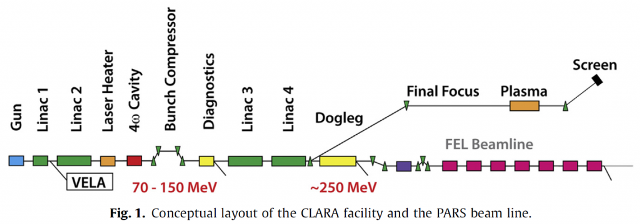Feb 1 2016
Particle accelerators find many applications in fundamental research, as well as in health, energy and security applications. They range from relatively compact, sometimes even table top devices to km-size particle colliders to unravel the secrets of the universe.

In order to reduce the size, costs and complexity of these facilities, particle-driven plasma wakefield acceleration is a very promising alternative to commonly used radiofrequency accelerators. High quality electron beams can act as ideal driver for a plasma that is then used to produce a very high accelerating gradient of the order of GV/m – that is a potential difference of 1 Billion Volt over one meter – to accelerate another electron beam to high energy. The high repetition rate of such scheme is another advantage that shows high promise for a number of application.
An international research team, led by Dr. Guoxing Xia from the Cockcroft Institute/University of Manchester, has proposed a detailed concept of how a dedicated research station for this new type of accelerator could look like if it became part of the future CLARA facility at Daresbury Laboratory. In a paper published in the expert journal Nuclear Instruments and Methods A they describe how this Plasma Accelerator Research Station (PARS) would enable unique studies into the critical issues for the next generation of plasma accelerators; in particular investigations on high gradient acceleration, two-bunch acceleration, plasma lenses and advanced beam handling techniques.
The researchers have studied the longitudinal wakefield distribution and the detailed effects on the accelerated electron beam in simulation studies. Their results provide important guidance when it comes to a further optimization of PARS and planning of experiments.